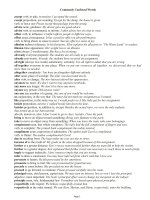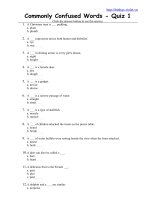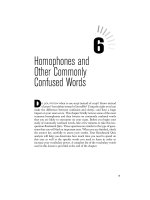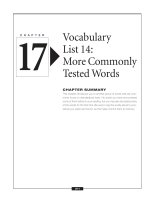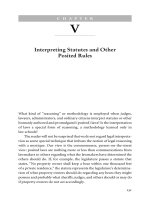Homophones and Other Commonly Confused Words
Bạn đang xem bản rút gọn của tài liệu. Xem và tải ngay bản đầy đủ của tài liệu tại đây (143.88 KB, 18 trang )
D
o you know when to use accept instead of except? Ensure instead
of assure? Incredulous instead of incredible? Using the right word can
make the difference between confusion and clarity—and have a huge
impact on your exam score. This chapter briefly reviews some of the most
common homophones and then focuses on commonly confused words
that you are likely to encounter on your exam. Before you begin your
study of commonly confused words, take a few minutes to take this ten-
question Benchmark Quiz. These questions are similar to the type of ques-
tions that you will find on important tests. When you are finished, check
the answer key carefully to assess your results. Your Benchmark Quiz
analysis will help you determine how much time you need to spend on
this area as well as the specific words you need to learn in order to
increase your vocabulary power. A complete list of the vocabulary words
used in this lesson is provided at the end of the chapter.
Homophones and
Other Commonly
Confused Words
6
99
JUST IN TIME VOCABULARY
100
BENCHMARK QUIZ
Choose the correct word in the parenthesis to complete each sentence.
1. Lilin (alluded/eluded) to problems with her boss, but she didn’t say
anything directly.
2. Xiu is coming this afternoon to determine the (extant/extent) of the
problem.
3. The checks were (disbursed/dispersed) this morning.
4. Once again, Luna has come up with an (ingenious/ingenuous) solution
to the problem.
5. We will (waive/wave) the late fee because of your extenuating cir-
cumstances.
6. Please (precede/proceed) with caution through the construction zone.
7. Reina is in (eminent/imminent/emanate) danger and needs our help
right away.
8. Jillian met with a lawyer to see if her landlord could be ( persecuted/
prosecuted) for his negligence regarding her apartment building.
9. It was a grueling six-hour (ascent/assent) from our camp to the top of
the mountain.
10. Here is a list of the books the school librarian would like to (censor/
censure/sensor) because she feels they are inappropriate for children.
BENCHMARK QUIZ SOLUTIONS
How did you do on identifying the correct word? Check your answers here, and
then analyze the results to figure out your plan of attack for mastering this topic.
◗
Answers
1. alluded. To allude means to make an indirect reference to.
2. extent. Extent means the range, distance, or degree to which some-
thing reaches or extends.
HOMOPHONES
101
3. disbursed. To disburse means to pay out.
4. ingenious. Ingenious means marked by inventive skill or creativity;
showing inventiveness and skill, remarkably clever.
5. waive. To waive is to give up (a right or claim) voluntarily, relin-
quish; to refrain from enforcing or insisting upon (a rule, penalty,
standard procedure, etc.).
6. proceed. To proceed means to go forward or onward, especially after
an interruption; move on, advance.
7. imminent. Imminent means about to occur, impending.
8. prosecuted. To prosecute is to bring a criminal action against (someone).
9. ascent. An ascent is an upward slope; a movement upward, advancement.
10. censor. To censor is to forbid the publication, distribution, or other
public dissemination of something because it is considered
obscene or otherwise politically or morally unacceptable.
BENCHMARK QUIZ RESULTS
If you answered 8–10 questions correctly, well done! You are already famil-
iar with some of the most common homophones and frequently confused
words. Give the lesson a quick review and do the practice exercise. If your
score on the practice test is equally high, move on to Chapter 7.
If you answered 4–7 questions correctly, you seem to be familiar with some
of the most common homophones and frequently confused words. But you
need more practice to really sharpen this skill. Be sure to set aside some time
to carefully review the commonly confused word sets listed in this chapter.
If you answered 1–3 questions correctly, you need to learn how to differ-
entiate between homophones and other commonly confused words in order
to build an effective vocabulary and communicate clearly. Study the lesson
that follows carefully, and do the practice quiz on a separate sheet of paper
so that you can do the exercise several times if necessary. Take extra time to
learn the commonly confused word groups in this chapter and use the source
listed in Extra Help at the end of the chapter for more review and practice.
JUST IN TIME VOCABULARY
102
JUST IN TIME LESSON—
COMMONLY CONFUSED WORDS
Imagine that you are reading a story to a child and you come across the fol-
lowing sentence:
The night sleighed the dragon.
Chances are the child would have no trouble understanding what you
read, but because you see the words on paper, you can see that something
is wrong: the writer has confused two different homophones. As a result, the
written sentence means something very different from what the writer
intended and what the child understands. Indeed, the written version is not
only incorrect; it is also illogical.
A homophone is exactly what its two Greek roots suggest:
homo phone
same sound
It is a word that sounds the same as another but has a different meaning.
Night and knight, for example, are homophones, as are slay and sleigh, great
and grate, and bear/bare. There are dozens of homophones, many of which
you already know by heart, others that you may still find confusing. If so,
this chapter will help you get them straight.
GLOSSARY
HOMOPHONE
a word that sounds the same as another but has a different meaning and
spelling
Spelling and grammar tests will often ask you to determine the correct
homophone for a given context—whether you should use whether or
weather in a sentence, for example, or piece or peace. It is very important to
know your homophones and use them correctly. Otherwise, you may con-
fuse your readers with sentences that are at best incorrect and at worst
unintelligible. So take some time to review the homophones in the listing
on the following page. Then go on to the rest of the lesson. Although
homophones like farther and further may be confusing, they aren’t likely to
appear on the vocabulary section of a test like the Postal Worker exam, the
PSAT exam, or even the GRE General test. The rest of this lesson will
review the kind of commonly confused words you are more likely to
encounter on your exam.
HOMOPHONES
103
COMMON HOMOPHONES AND OTHER
FREQUENTLY CONFUSED WORDS
The following listing shows some of the most common homophones and
other frequently confused word pairs along with a brief definition of each word.
Confusing Words Quick Definition
accept recognize
except excluding
access means of approaching
excess extra
adapt to adjust
adopt to take as one’s own
affect to influence
effect (noun) result
effect (verb) to bring about
all ready totally prepared
already by this time
all ways every method
always forever
among in the middle of several
between in an interval separating (two)
assure to make certain (assure someone)
ensure to make certain
insure to make certain (financial value)
beside next to
besides in addition to
bibliography list of writings
biography a life story
breath(noun) respiration
breathe (verb) to inhale and exhale
breadth width
JUST IN TIME VOCABULARY
104
Confusing Words Quick Definition
capital (noun) money
capital (adjective) most important
capitol government building
complement match
compliment praise
disinterested no strong opinion either way
uninterested unengaged; having no interest in
envelop surround
envelope paper wrapping for a letter
farther beyond
further additional
immigrate enter a new country
emigrate leave a country
imply hint, suggest
infer assume, deduce
loose not tight
lose unable to find
may be something may possibly be
maybe perhaps
overdo do too much
overdue late
personal individual
personnel employees
precede go before
proceed continue
proceeds profits
principal (adjective) main
principal (noun) person in charge
principle standard
HOMOPHONES
105
Confusing Words Quick Definition
stationary still, not moving
stationery writing material
than in contrast to
then next in time
their belonging to them
there in a place
they’re they are
weather climate
whether if
who substitute for he, she or they
whom substitute for him, her or them
your belonging to you
you’re you are
COMMONLY CONFUSED WORDS—THE NEXT LEVEL
Now it’s time for the more sophisticated sets of commonly confused words—
groups of two or three words in which at least one is a good candidate for a
vocabulary exam. For example, here’s a pair of words you should already be
familiar with: team/teem. Remember teem from Chapter 2? This is a commonly
tested vocabulary word and a homophone. Chances are you won’t confuse
teem with team, since team is such a familiar word. But you should know what
teem means and make it part of your vocabulary as you prepare for your exam.
Another important reason to review homophones like team/teem and
waive/wave is to avoid a trap sometimes set by the test developers. That is,
you might encounter questions that use the definition of a familiar homo-
phone as a distracter. Here is an example:
To waive means:
a. to signal with an up and down or back and forth movement.
b. to return to the original starting point.
c. to relinquish a right or claim.
d. to swell up or rise to the surface.
e. to violate a rule or law.
The correct answer is c. Waive means to give up (a right or claim) volun-
tarily, relinquish; to refrain from enforcing or insisting upon (a rule, penalty,
